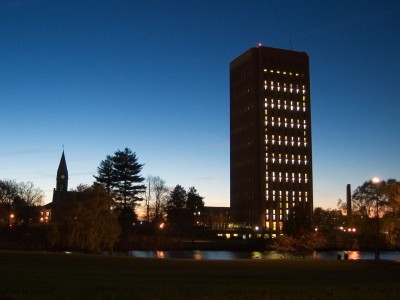The University of Massachusetts Amherst announced a policy change Wednesday regarding the acceptance of Iranian students into its science and engineering programs, according to a Wednesday press release.

The change followed a Feb. 12 announcement stating the University’s intent to prohibit Iranian students from enrolling in these graduate programs, citing the Iran Threat Reduction and Syria Human Rights Act passed by U.S. Congress in 2012.
UMass is now going to allow Iranian nationals to participate in the programs, while “developing individualized study plans to meet the requirements of federal sanctions law and address the impact on students,” the release stated.
“It’s important to understand that we recognize this matter absolutely could’ve been handled in a much better fashion,” said Ed Blaguszewski, executive director of news and media relations at UMass Amherst.
Blaguszewski said the University’s reasoning behind the initial policy was motivated by its desire to remain complicit with federal laws.
“There are certain areas of energy-related research that Iranian nationals are not allowed to participate in based on federal laws,” he said. “And so the university is required to be sharing information with the government when asked about the research, path and activities of students.”
Blaguszewski said the policy was initially passed in reaction to a case regarding an Iranian UMass student.
“Essentially, what prompted us to look at this in closer detail was an incident involving a student who had done research here, an Iranian student, that she was not allowed back in the country because of concerns about what research she was involved in here at UMass,” he said. “This is sort of a complex matter.”
The new policy is more personal and customized to remain in accordance with the law, Blaguszewski said.
“The thinking behind that was not to have students end up going down a path of study and then finding out that they were in an area that they shouldn’t be in. We still have to abide by the law, but we create an individualized study plan. So if you are a student accepted from Iran, you go to a university, develop a course of study and you will work with an advisor,” he said. “We will work with you to craft a plan of study where you can succeed and achieve and work in a laboratory.”
He emphasized that the school’s initial decision was only to remain in accordance with the federal law.
“We really want to emphasize the importance in welcoming students from across the world,” he said. “Throughout history, it’s very clear that many Iranian students really felt hurt and ostracized, and that’s very real and very clear, very genuine. We are about welcoming students and faculty and people from around the world, and this law puts us, and many universities, in a difficult situation to try to manage this law.”
The policy change followed impassioned student and faculty outrage, Blaguszewski said.
“The administration heard loud and clear the concerns that were voiced by many Iranian students and faculty. As a result, the administration chose to seek some additional outside council, some legal advice, talked to the state department and think through a better way,” he said. “The chancellor heard the concerns raised by faculty and students and decided that we need to revise what we were doing and take a different approach, so that’s what we’re doing.”
Jeffrey Hughes, associate dean of Boston University’s Graduate School of Arts and Sciences, said BU’s policy on Iranian national students entering science and engineering programs of study is dependent only on a visa.
“The Graduate School does not take nationality into account when admitting students into any program. Students from all countries can apply and be admitted into our programs,” Hughes said. “Of course, in order to matriculate, students from other countries need to obtain a visa from the U.S. government, a process over which Boston University has no control.”
BU typically does not have control over its policies which must be in compliance with United States laws, Hughes said.
“These are strict and often difficult to implement rules about giving access to technologies used in creating weapons to non-U.S. persons. The U.S. government defines these technologies broadly, and they include certain computer and space technologies, for example,” he said. “A university should be an open and free place.”
Several residents said the existence and legality of the procedure taken by UMass was surprising and disappointing.
Alexei Rodriguez, 40, of Roslindale, said the reversal of UMass’s decision is not a surprise.
“It’s a well-known university with a certain level of standards and international community, so it’s expected for them to do something like that,” he said.
Jason Yung, 24, of Allston, said that in the United States, no one should be kept from getting an education if they want one.
“I never thought that people would be banned from learning something, from actually gaining knowledge,” he said. “It’s a free country. Isn’t that what we’re famous for?”
Francis Bela, 25, of Allston, said he previously couldn’t imagine a law that barred anyone from studying a certain subject.
“I don’t really understand why such a law would be passed nationwide,” he said. “It’s something I find odd because I’ve also never heard of it. The law puts an amount of restriction on something that supposedly requires none. It must be really offensive. The way I see it, they expect more opportunities and a better chance at studying what they find interesting, but in the end, they’re cut off from it. I can’t imagine if that happened to me.”


